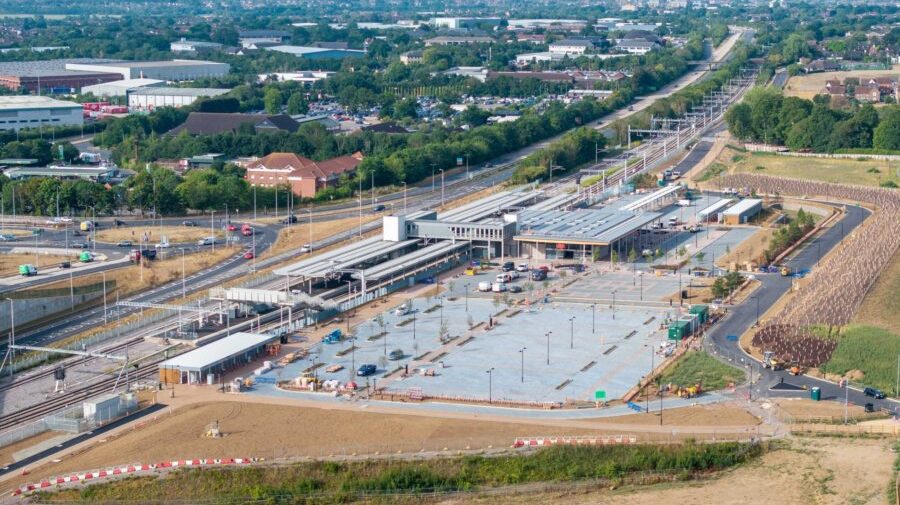White Rose Station, near Leeds, is set to go three years over schedule, with its entire £26.5 million budget spent. Butetown Station, in Cardiff, is still underway. On the Northumberland Line, metro mayor Kim McGuinness has had to step in with £10.9 million in funding to get the Northumberland Park Interchange back on track, with the station now scheduled for early 2026. Blyth Bebside is scheduled to open on 19 October, and North Tyneside for early 2026.
In the West Midlands, anybody living near three new stations mooted to open in 2024 will instead find months of roadworks taking place, as work continues on Moseley Village, King’s Heath and Pineapple Road stations.
Read more:
Then there are forward-looking plans. The Western Gateway scheme has plotted 30 new stations across Western England and South Wales. Its £11 billion cost depends on funding from central government – but proponents say it could bring £17bn into the UK economy.
Labour’s plan to nationalise train operating companies is expected to finish by 2027. While operating companies don’t build stations themselves, this move could help more stations be built by bringing money forward and joining-up thinking.
“For money to be purely reinvested back in the public sector, it has to be nationalised ownership,” said Martin. Instead of dividends paid out and money going to private hands, he added, “nationalising it has the ability to recoup all of that money for the public sector.”
Advertising helps fund Big Issue’s mission to end poverty
At present, different decisions on building stations and spending money are made by different people. Money goes to one place and comes from another. For example, the new Beaulieu Park Station is being built by Network Rail at the behest of Essex County Council, using money from central government as well as housing companies. The nationalised Great British Rail has the potential to put this all in one place, with its own motivation and the ability to make longer-term decisions, said Michael Solomon Williams, head of campaigns at the Campaign for Better Transport.
“That doesn’t necessarily make everything better straight away,” said Williams. “We believe it will only succeed if it comes with a real commitment to expanding that network.”
The scar for anybody talking about expanding the railways is the Beeching cuts – in fact, the Campaign for Better Transport was founded to reverse their impact. In the 1960s, a report by Lord Beeching resulted in 2,363 stations being earmarked for closure – amounting to around a third of the UK’s network.
Boris Johnson’s levelling up agenda included a £500m “Beeching Reversal Fund” – also known as the Restoring Your Railway Fund. But as governments changed, that fund fell victim to Labour chancellor Rachel Reeves’s cuts in 2024, with an estimated £85m saving.
A lack of consistency is a barrier to expanding the UK’s railways, said Mark Havenhand, who leads consultancy Arup’s rail planning team.
“There’s no overall plan here. Government, Network Rail, you know, the rail industry is not looking top-down at where the demand is, where it should have those stations, and building a whole planning system around it. It’s very kind of ad hoc,” Havenhand said.
Advertising helps fund Big Issue’s mission to end poverty
Not only can train lines and stations help houses get built, but they can make houses near them more desirable. Homes in London 500 metres from a station command prices £42,700 more than homes 1,500 metres away, a recent study found.
That may be the market’s way of expressing the value of these stations. Williams, of the Campaign For Better Transport, said the boost to health and the economy was clear and obvious.
“We’d see far better life chances. At the moment the worst outcome of a lack of connectivity is low life expectancy, worse access to jobs and opportunities and that increases deprivation and increases inequality across the country,” he said.
“The reason why we have such such economic wealth and growth in London and not as much easily spread across the UK, is because of transport connectivity, quite simply.”
By one count, 16 stations in the UK were expected to open in 2025. There’s nothing on Earth like a genuine, bona-fide, expansion of the rail.
Do you have a story to tell or opinions to share about this? Get in touch and tell us more.
Advertising helps fund Big Issue’s mission to end poverty
Reader-funded since 1991 – Big Issue brings you trustworthy journalism that drives real change.
Every day, our journalists dig deeper, speaking up for those society overlooks.
Could you help us keep doing this vital work? Support our journalism from £5 a month.









